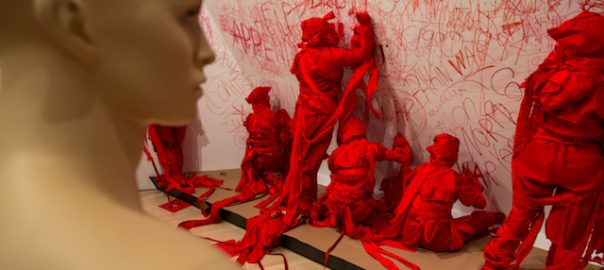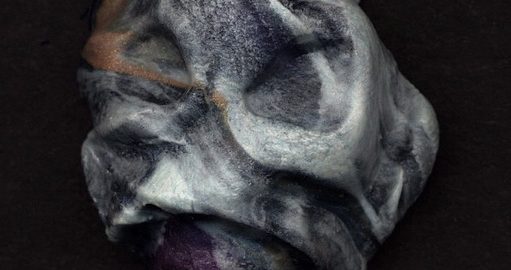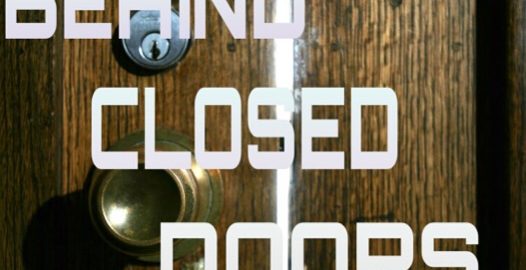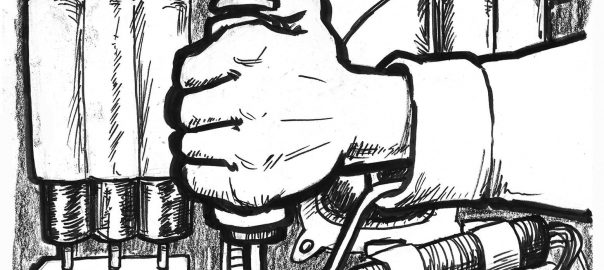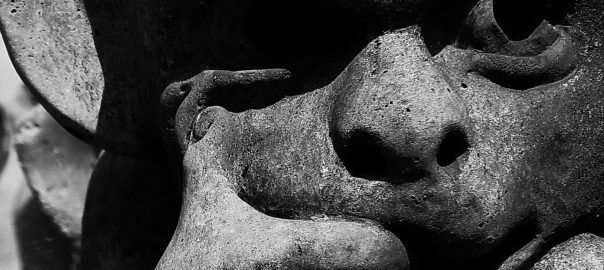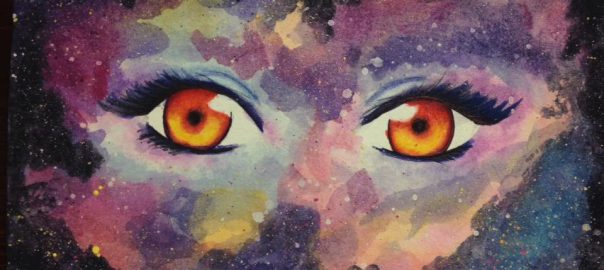He had just stepped off of the bus when it exploded. The woman’s scream came a split second before: it was his own name–Patrick Wittenberg– wailed at lunatic volume, and in a single rushed breath. They were the last words a young woman would speak and the last many passengers would hear.
Patrick experienced the explosion as a warm hand that swept him through the window of a drycleaners and into a cushion of freshly pressed articles hanging on a serpentine track. Patrick fell into them, the delicate plastic bags that cocooned the slacks and dresses already puckering from the billowing heat, the tumbling clothes neatly swaddling him. Almost at once an aftershock shook the building and sent another cascade of clothes over him.
He didn’t pass out. He wasn’t even badly hurt, and the layers seemed to comfort rather than smother as they pressed down upon him, muffling the terrible sounds of aftermath. He stayed where he was, hidden and safe until the emergency workers dug him out of the scorched overcoats and smoldering dresses.
A stranger found him. Patrick heard and felt the ambulances and fire trucks as they swept in, heard the rational, if excited voices, as they replaced the screaming. “Are you ok? Where are you hurt? You’re going to be all right!” This last said with an intensity that to Patrick’s ears belied the meaning. He stayed motionless in his cocoon until he felt the upper layers being disturbed. “There’s someone in here!” a voice shouted. “I need help!” Patrick’s rescuer was an older man, in his fifties at least. His sleeves were rolled up, and his shirt unbuttoned. Patrick guessed he’d been wearing a tie but had taken it off. There were ties all around them that the explosion had liberated from their hangers and bags.
“Can you stand up?” the man asked.
“I don’t think I should be moved,” Patrick said.
Emergency workers charged in. “Don’t move him!” a fireman shouted as a paramedic kneeled and held an oxygen mask over Patrick’s mouth. “Where is your pain?” he asked, his hands moving over Patrick’s limbs.
Patrick found himself wondering about his health care. His job didn’t provide any for him so he got it through a state program implemented last year. This would be his first test of the system, but for what he paid, he wasn’t expecting much.
#####
“Did you know her?” the detective asked, and he showed Patrick an image downloaded from the bus security camera. Patrick’s ears were ringing so badly that sounds of nearly everything beyond a distance of a few feet were lost in the static. The yards of police tape slung across the closed road were, to him, whipping silently in the strong autumn wind.
“Oh my god,” Patrick said as he recognized Claire’s features in the pixels and shadows of the laptop image. “I do know her. I just met her last weekend. At a party.”
The sum of his awkward experiences with Claire came to his memory: her quiet voice, her long chestnut hair, her shy—but somehow, he had thought at the moment he first kissed her, wicked — smile. It hadn’t been wicked, he learned. There was nothing wicked about her. She was a lonely person who had been trying to make a connection, and in Patrick, she had chosen badly. The memories of their encounter–the Sunday morning in her apartment, the cats on the bed, the way she kept the sheet pulled up over her body, his own excuses as he got out of there– left a flavor in his mouth as foul as the odor of burning seat cushions and melted rubber hovering all around them.
The detective raised his hand and two other men in suits hustled over. “Why’d she do it?” he asked, speaking loudly with his mouth close to the side of Patrick’s ears. “Why’d she blow up the bus? And why did she shout the name Patrick Wittenberg before she blew herself up?”
#####
“That’s incredible,” Steve said. “She was trying to kill you, out of all those people, and you came through it without a scratch, really?”
Patrick wanted Steve to go away. His doctor had been right; he shouldn’t have come back to work today. His head was ringing, and the minor burns along his back and legs were still sore. Just three days had passed, but Patrick had wanted to put the bombing behind him and get on with his life as quickly as possible. Coming to work had seemed the best way to do that, but he hadn’t thought of Steve.
“I don’t know that she was trying to kill me,” Patrick said. “She just shouted my name, is all. She could have been trying to warn me that she was going to blow the bus up.” No one had ever tried to kill him, or to his knowledge had ever wanted to. He was a twenty-eight-year-old advertising salesman for a neighborhood newspaper: a single, slightly pudgy, non-voting white male with a video game habit that was just beginning to do too complete a job of filling the empty hours in his life. The possibility of his having mortal enemies fell somewhere between extremely unlikely and impossible.
“Where did she get the explosives, do you think?” Steve was from South Carolina had a subtle southern accent his clients found charming but that set Patrick’s Connecticut sensibilities on edge.
“I don’t know anything about any of that,” Patrick said. “I hardly knew her.” He made a show of picking up the phone and dialing. All Steve had to do was spin his chair so he would be facing his own desk and then they both could get back to work, leaving all Patrick’s recent unpleasantness well behind them.
Steve didn’t spin the chair. Patrick was trying not to look at him but he saw Steve’s eyes look towards the door of the small office they shared and his left hand raise a pen in greeting.
“What the fuck, Patrick?” Patrick jumped slightly at the profanity, but the number he had dialed was ringing, and he didn’t turn around. He knew that it was Matt, the newspaper’s graphic designer. Matt was several years older than Patrick, thin, high-strung, usually badly dressed. If Patrick thought of Matt at all, it was to make him feel better about the state of his own life by comparison. They weren’t friends and didn’t have the kind of work relationship that excused such language, and such talk certainly wasn’t welcome in the office, but Patrick was too strung out to deal with Matt’s bullshit right now. He pinched the phone between his shoulder and ear and pointed at it with a pen as a subtle indicator that Matt should shut the fuck up and come back when he wasn’t on the phone with a client. On the other end, voicemail picked up, and Patrick stabbed at the pound sign to leave a message. He didn’t look up even as Matt put a thumbdrive on Patrick’s desk with too much force.
“Hi, Bill, this is Patrick over at the Banner, and I wanted to reach out to you…” He kept going with his message, his tone warm, assertive and casual. He recognized the drive as one a client had given him for their new ad and suddenly realized he had handed it off to Matt without proofing the contents.
“I can’t use this shit, Patrick,” Matt said, so loudly that his voice must have carried over the phone line. Patrick cursed and stabbed the 3 button with his pen. “What was that?” A recorded voice said politely in his ear. “I don’t understand.” Shit. The client’s phone menu was different than what Patrick was used to. He couldn’t hang up, not with Matt’s profanity on the message. He’d have to listen to the whole menu and figure out how to re-record or at least delete. “If you are happy with your message, please press one…”
Matt pulled the power cord out of the phone’s cradle, disconnecting him. “Listen to me, Patrick,” he said as Patrick sat in stunned disbelief. “The images on here are for internet, not for print. It will look like ass, and you know it. I’ve told you fifty fucking times to tell your clients 300 dpi or higher or don’t fucking bother!”
Patrick closed his eyes in exasperation. “Jesus Christ, Matt an exploding bus blew me through a plate glass window Monday, OK? Give me a fucking break!”
“And that makes it all okay?” He said. “I’m supposed to recreate this logo from scratch because Patrick Wittenberg is too fucking lazy to do his job?”
“Fuck it,” Patrick said as he turned his back on Matt and unplugged his cell phone from where it lay charging near his inbox. He was going home early. Between Steve’s stupid questions and Matt’s random batshit fury, he couldn’t get any work done. Besides, his ears were still ringing so badly he could barely understand the clients he did reach.
“No more, Patrick!” Matt shouted, his voice wayyyy too loud for the office. “My cleaning up after you ends here, today!”
Patrick started to turn towards him, his rising temper inspiring him to contribute his own share of comments inappropriate for the workplace, but his motion was checked by the unusual look on Steve’s face.
Steve sat staring, hands half-curled in his lap, eyes wide and locked over Patrick’s shoulder. “Bu bu bu…” he stammered.
Patrick turned and saw that Matt had unbuttoned oversized (and completely wrong for an office environment, but creative people, what can you do?) plaid shirt, revealing his narrow frame, adorned with dangling wires that fed into plastic bottles filled with liquids of uncertain red and green hues. Matt’s small, spidery hands held a wire and a large battery. “Fuck you, Patrick Wittenberg!” he shouted, and with Matt’s swift motion the world retreated behind a curtain of fire and sound.
#####
“I said you’re lucky to be alive!” the paramedic shouted into Patrick’s abused right ear. Incredibly, it was the same man who had pulled him out of the pile of smoldering overcoats just days ago.
Patrick didn’t feel lucky, but he had to agree. He had been partially shielded by a wall of his cubicle, and the huge square of burning cloth-covered particleboard had shoved him neatly through the window, where he had fallen several feet to land on the roof of a parked car. Miraculously, the glass had done little more than tear his clothing. Nothing was broken, and none of the cuts that he had taken were serious. He hadn’t even been singed this time, although he would soon learn that nearly everyone else in the office had been killed or maimed.
#####
Patrick’s hands were shaking; he was having a hell of a time lighting his cigarette. He didn’t want to smoke. He had already swallowed too much smoke this week, smoke and the dust of pulverized wood, metal, and concrete. His lungs felt plastered over.
But he needed the nicotine right now, more than he ever had before. He was relieved to have something comforting to turn to, no matter what the damage to his body. If his nicotine addiction had manifested in a physical form at that moment, he would have hugged it.
His pocket buzzed. His ears were so damaged now that he sometimes didn’t hear his cell phone ring, so he’d set it on vibrate to compensate. He saw that is was his mother calling, and with a slight surprise, he realized that made him happy. He could use some unconditional support right now.
“Why are they doing it, Patrick?”
Of course she had heard. Even through the ringing, the earpiece carried an unusual inflection in her tone, as if the question wasn’t a question.
“Why are they doing what?” he repeated, his own voice thick with rhetorical absurdity. “Why are people killing themselves all around me, because of me, as some asshole cop even said? How the fuck should I know?” He never used vulgarity in front of his mother, he thought it rude and unnecessary, but now he was shaking all over, and his grasp on what was appropriate was sliding away from him. “It’s fucking insane, it’s complete madness, I haven’t done anything to anyone—“
“Haven’t you?” his mother said. “Look at your life, Patrick, look at how much you take and how little you give—”
Patrick was furious, and he took it out on his cigarette. “I’m no different than anyone else!” he shouted as he threw the butt to the ground and crushed it beneath his shoe. “I’ve done nothing to deserve this!” He was suddenly crying. “I’ve seen people’s guts now,” he said, struggling to explain the reality he found himself in. “I’ve seen people in pieces, small ones, so you can’t tell who was who, and they say it’s all my fault, but I don’t do anything wrong. I just live my life—”
“A small, selfish life.” his mother said. “I tried to turn you way from that, onto better things. Meaning, purpose, faith…”
“I try!” Patrick said although he had no idea what he was being accused of or what he was claiming to be trying.
“I’m out here, every day…”
“I tried, too, Patrick.” She said. He could hear that she was crying, now, also, and something else—some shuffling with the handset, as if she were folding laundry or some other task as she spoke. “I tried, but nothing seemed to reach you but this. Goodbye. Listen to what the world is telling you. Pay attention.”
The phone went dead. No static, no click of disconnection. The call simply ended.
#####
Her funeral was televised, and Patrick watched it, smoking in his living room. His roommate had moved out after the second bomb so clearly the no smoking in the house rule had been repealed.
As the third suicide bomber associated with Patrick Wittenberg, Patrick’s mother was an overnight celebrity. Patrick didn’t go to the funeral, didn’t even make an effort to. No airline would carry him, and his own black celebrity kept him shut up in the house. Not that many reporters came to talk to him. People were beginning to be afraid of him. Even the FBI and others investigators had slowed to a trickle. The apartments around his were all empty now, he knew.
She had been a school teacher and popular in the small town where she had lived most of her life. The funeral hall was packed, and the footage from inside was on video with small cameras that didn’t take up too much space from the mourners. Patrick was shaking all the time now, trembling like an animal that lived in constant threat of abuse. His eyes watered, and his ears were so sensitive that he avoided sound when he could. He had the television low, and couldn’t hear the service, so he didn’t know that the minister and other speakers had only paid the slightest tribute to his mother. They mostly talked about Patrick — his bad habits, his unfulfilled potential, what they saw as his failed obligations to the world. They didn’t know how to reach him, nothing seemed to work, so they would try one last thing, one tremendous thing, a terrible thing many of them had come prepared to do, and do together.
#####
Hundreds had died at the funeral, their remains sieved through so many simultaneous explosions that identification would be impossible.
Reporters came to Patrick’s apartment, arriving shortly before the FBI. Most of them were killed when one of the photographers blew himself up on Patrick’s doorstep. Patrick, who had locked himself in the bathroom, curled up in the bathtub while fully dressed, alternately crying and playing a puzzle game on his Nintendo 3DS, once again escaped with minor injuries. He was hospitalized just the same.
#####
Patrick’s hospital room was off-limits and guarded 24 hours a day by a conglomerate of anti-terrorist and law enforcement agencies. Patrick sat in bed, ears stuffed with cotton, small patches of white tape concealing dozens of cuts and abrasions.
“It’s because you’re a user, Patrick.” The orderly said.
“Fuck you,” Patrick said. “You don’t know me. None of those people did, not even my mother, not as an adult, anyway. I have a life, my own life. I chose it, and it’s mine to live however I want to. I’m not responsible for anyone else, and that’s how I want it.” Patrick wasn’t sure if all of this was true or not. The words were coming too quickly to be carefully considered. He simply knew that he wasn’t going to be bullied into anything.
“So all of us are wrong, and you’re right?” the orderly said. “The entire world needs to keep cleaning up your messes because you have a right to live the way you do?”
“It’s your god damn jobs!” Patrick said, gesturing at the man’s white smock. “I didn’t ask for people to start exploding themselves all around me!”
“That’s right, nothing is your responsibility, fuck the rest of the world as long as Patrick Wittenberg gets things the way he wants them! Well, maybe we’re not willing to accept that.”
“Accept what?” Patrick shouted. “And why do you keep saying ‘we?’” But he knew why. Even as his words thudded dully against his traumatized eardrums, he knew why. The orderly slipped his hand into his coat and now held a slim cylinder in his hand, connected to a wire that ran into the jacket. “Die, Patrick Wittenberg,” he near-whispered, eyes closed, teeth clenched, as if bracing himself against what would follow could have any consequence.
The plunger buzzed like a cell phone set to vibrate, but that was all. The orderly’s eyes flew open, the pale blue irises clearly surprised to be tasting light again. Patrick was on his feet, running with an awkward, crazed gait. His equilibrium was tattered from too many explosions, his sense of direction unreliable. His eyes had already started watering from the very idea of another blast, and he bumped into furniture and the doorframe before he made it out of the room.
The orderly was on Patrick’s heels, fingers twisting and pushing at the homemade detonator when he felt something click—felt it, but was too swiftly killed to hear it.
Patrick experienced this explosion as a pelting rain, a fusillade of rubble that swarmed past him in a hail of dust and stinging debris. He was knocked over and lay there, smothered in déjà vu. He was shaking all over, he wanted to stand but wasn’t sure that he could. His hands opened and closed on smoking-hot splinters and twisted drywall screws. “I DO have a right,” Patrick said into his pillow of dust. “I have a right! I have a right! I have a right!”
He didn’t know who he was talking to, or even what he truly meant, or where this right had come from, or what it in fact entitled him to. He knew that he was unfulfilled and that he was often unhappy, but what he had was all he had ever known. He would never, ever willingly give it up. Never.
He waited for the rescue workers, to stand him up and set him back into his routine. He already wanted a joint, a strong drink, a steak and cheese sandwich, long evenings to waste in movies, video games, pornography.
He had a right.
Copyright 2016 by Gregory Adams. All rights belong to the author and material may not be copied without the author’s express permission.
Gregory Adams lives and writes near Boston. He has published two collections of strange stories One Day in Hell and The River Above. www.gregoryadams.net.
Featured Image by F. Andrew Taylor
